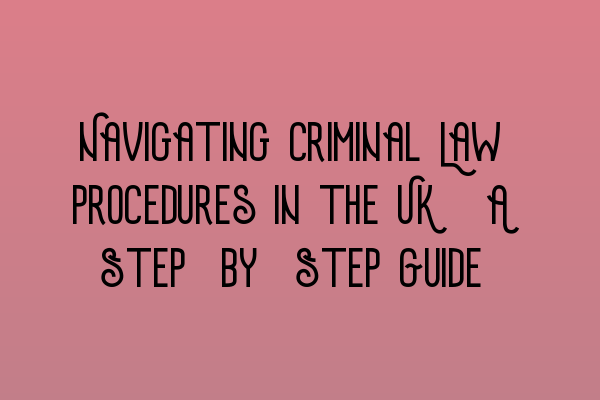Navigating Criminal Law Procedures in the UK: A Step-by-Step Guide
If you find yourself involved in a criminal law case in the UK, it’s crucial to understand the procedures that will be followed. The criminal justice system can be complex and intimidating, but with the right knowledge and guidance, you can navigate it effectively and ensure the best possible outcome.
In this comprehensive step-by-step guide, we will walk you through the key stages of criminal law procedures in the UK. From arrest to trial, we will provide you with valuable insights and advice to help you understand the process and make informed decisions.
1. Arrest and Police Investigation:
The first step in any criminal law case is usually the arrest. If you are detained by the police, it’s important to remember that you have certain rights, such as the right to legal representation. Contacting a solicitor at this stage is highly recommended, as they can guide you through the process and protect your interests.
Once arrested, the police will conduct an investigation to gather evidence. This may involve interviews, statements, and forensic examinations. It’s crucial to cooperate with the police, but always seek legal advice before providing any statement or answering questions.
2. Charged and Bail:
After the investigation, the police will decide whether to charge you with a criminal offense. If charged, you will be presented with a list of specific charges. At this stage, you should consult with a solicitor to understand the implications of the charges and explore your legal options.
Depending on the seriousness of the offense and other factors, you may be granted bail. Bail allows you to be released from custody while awaiting trial, subject to certain conditions. Your solicitor can make representations to the court on your behalf to secure bail, if appropriate.
3. The Prosecution Phase:
Once you are charged and released on bail, the case moves into the prosecution phase. The Crown Prosecution Service (CPS) will review the evidence gathered by the police and determine whether to proceed with the case.
During this phase, it’s essential to work closely with your solicitor to build a strong defense strategy. They will examine the evidence, challenge its validity, and gather any additional evidence that could support your case. Your solicitor will also engage in negotiation with the CPS to explore the possibility of resolving the case without going to trial, if appropriate.
4. Case Management and Trial:
If the case proceeds to trial, it will be assigned to a specific court. Your solicitor will guide you through the case management process, which involves setting trial dates, exchanging evidence with the prosecution, and making any necessary legal submissions.
During the trial, the prosecution will present their evidence, and your defense team will have the opportunity to challenge it and present your own evidence. It’s essential to have a solicitor with expertise in criminal law who can effectively cross-examine witnesses, challenge the prosecution’s case, and present a robust defense on your behalf.
5. Verdict and Sentencing:
After the trial, the jury (in some cases) or the judge will deliver a verdict. If you are found not guilty, the charges against you will be dismissed, and you will be free to go. However, if you are found guilty, the court will move on to the sentencing phase.
Sentencing depends on various factors, including the nature and severity of the offense, your criminal history, and any mitigating circumstances. Your solicitor can make representations to the court to ensure that the sentence imposed is fair and proportionate.
6. Appeals:
If you believe there were errors or miscarriages of justice during your trial or in the sentencing process, you have the right to appeal the decision. Consult with your solicitor to review your case and determine the grounds for appeal.
Conclusion:
Navigating criminal law procedures in the UK can be challenging, but with the right guidance and legal support, you can protect your rights and achieve the best possible outcome. If you find yourself involved in a criminal law case, it is crucial to seek professional advice from a qualified solicitor specializing in criminal law. They will be your ally, advocate, and expert guide throughout the entire process.
At SQE Criminal Law & Practice Law UK, our team of experienced solicitors is well-versed in criminal law procedures. We have a track record of successfully defending our clients’ interests and ensuring fair outcomes. Contact us today for a consultation and let us fight for your rights in the criminal justice system.
Keywords: criminal law procedures, criminal justice system, UK, arrest, police investigation, legal representation, charged, bail, prosecution phase, Crown Prosecution Service, defense strategy, case management, trial, verdict, sentencing, appeals, solicitor, SQE Criminal Law & Practice Law UK.
